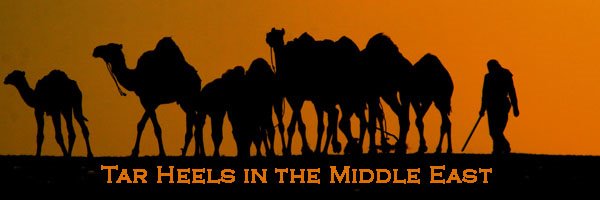sam
A lot of people ask me why I’m interested in the Middle East. Some combination of cultural-linguistic fascination and current events, I suppose. I sometimes try to interrogate myself as well, in order to facilitate more articulate answers. Unfortunately, conversations with my ego about the Middle East usually go something like this:
Id: Why am I studying the Middle East? What brings me to this far away region? Did an opthamologist really secure 97% of the vote in the recent Syrian presidential election? Who killed ‘Ali? Why did I choose a language with glottal stops?
Superego: Is that cherry shisha I smell?
Given the depth of my internal dialogue, you can imagine the trouble I have in more formal settings. When I visit the Middle East or, more frequently, apply for schemes that will allow me to visit the Middle East, I’m forced to grapple with this. Once on a boat in the Bosphorous a Syrian man asked me this same devilish question and I (do many things say naïve better than fosha?) answered, “Ureed an afham al-sharq al-awsat,” which, for you non-scribbly speakers out there, means “I want to understand the Middle East,” in the most pretentious formal Arabic possible. The man laughed and said pointedly in English, “I’ve lived in the Middle East all my life and still don’t understand it.”
As for my various applications, I usually dress up an Edward Said quote, expressing my desire to promote cross-cultural understanding in the name of moving past the essentialized caricatures that justify military aggression. It’s sort of like that line from Talladega Nights about baby Jesus – you know, “I like to picture baby Jesus in a tuxedo t-shirt because it says I wanna be formal but I'm here to party” – except in this case the Said quote says I’m formal and the opposition to military aggression means I’m a hippie – which pretty much means I’m ready to party.
But seriously, I’d like to think – in my own little Ivory Tower way - that I’m somehow battling hegemonic and neo-colonial discourses of power through my education. Who knows, though? In the midst of intellectual theorizing and, well, not-so intellectual theorizing (see Ricky Bobby quote above), I sometimes lose sight of what’s at stake.
What I do know is this. The guy sitting next to me on the flight from New York to Amsterdam had a standard issue pixilated desert camo back pack with his last name printed on it beneath his seat. Before the flight started he flipped up his phone, speaking in rapid Spanish to his mother. Once we lifted off, he pulled out his PSP, playing what appeared to be Space Invaders for the duration of the flight. Squinting behind his glasses and clad in an Old Navy polo shirt, he might have been younger than me. He spoke with a man across the aisle about his imminent deployment. “I don’t see us getting out for the next five years at least,” the man across the aisle said, in the type of voice that’s usually followed by a low whistle. “Well I’m locked in for the next 5 years. That means at least three tours left,” the Space Invader killer said.
I bore this in mind during my first few days in Amman, a city no stranger to the scars of war either, with an influx of between 400,000 (the word on the street) and 750,000 (government estimated) Iraqi refugees prompting some Jordanians to refer to upscale ‘Abdoun by the name of ‘Adhamiya, a Sunni neighborhood of Baghdad. And, of course, these are the lucky ones. They join over a million refugees to the north in Syria as those who have temporarily escaped a maelstrom that has killed upwards of 650,000, if you listen to academics.
Now, this isn’t about setting up a binary of suffering or some calculus of misery. After all, we all lose in situations of human suffering. And this is the point, I suppose: that no one is winning here, nor will anyone ever win. Not the bespectacled GI rolling the dice for his remaining tours of duty, not the Iraqi refugees forced to desperate measures.
I’m still trying to comprehend the enormity of the situation. And I’m struggling. And I don’t know if a “better” (whatever that means) or a larger cadre of Middle East specialists could have overcome the quixotic idealism of the neo-conservative movement, the lockstep jingoism of the American media, or the climate of fear among the American public. Colossal efforts by peace groups and rational thinkers came up short. So I don’t know.
But maybe we can keep this in mind as we commence our journeys of learning. It can give us pause, it can give us perspective, and it can give us purpose. Or maybe just a new line for applications.

3 comments:
you are the cleanest hippie i know
jut jut jut :p
"Deep unspeakable suffering may well be called a baptism, a regeneration, the initiation into a new state." - George Eliot
i looked that one up for you to get it just right. attempting to understand the devastating depths of human tragedy has nearly blown a crater into my frontal lobe more than once in my life. but that was only because i was seeing it as simply "it" and not within its greater humanitarian context. i don't know if badness has to happen in order for us to value goodness or for a stronger, more acute and impressive kind of goodness to form, but i do know that taking human suffering without hope means the frontal lobe goes kaboom. in other words, sam dolbee, you are psychosomatic, and by that i mean that you could start a fire with your thoughts.
sam! <3
Post a Comment